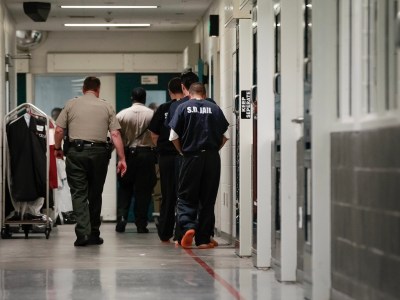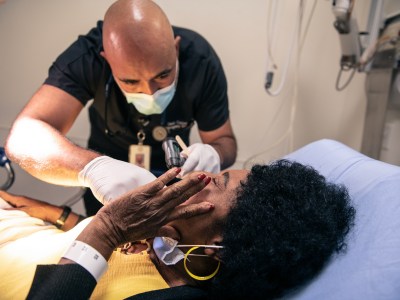In summary
CalMatters has published more than 11,000 stories and columns that Californians have used to transform the state’s future.
Nine years ago today, CalMatters started publishing journalism to hold officials accountable, reveal unseen community issues and empower Californians.
Our nonprofit newsroom has grown steadily over time, but this year has been especially unique: We added The Markup’s tech-focused team, hosted the inaugural CalMatters Ideas Festival in Sacramento, debuted the government transparency tool Digital Democracy, and started airing on California TV five nights a week through PBS SoCal.
The journalism we published over the past year has been called “powerful, impactful journalism” with “great storytelling and (an) impressive depth of reporting” in awards honoring our investigative projects, while our news team also added a second Northern California Emmy to our awards wall.
“We strive to provide unbiased, nonpartisan reporting to hold the powerful accountable. With our colleagues from the Markup we are now even better positioned to report and investigate the intersection of government, technology and privacy on our lives and in our community” said CalMatters Editor-in-Chief Kristen Go.
The Markup joins CalMatters
Earlier this year, CalMatters announced it was acquiring The Markup, a national, investigative nonprofit newsroom that challenges technology to serve the public good
“The Markup journalists built an incredible news operation that has prompted meaningful change nationwide,” said CalMatters CEO Neil Chase. “I’m excited that our combined news operation is so much more powerful than either of us could have been independently.”
“Both newsrooms have proven track records of creating journalism and tools that are independent, community-driven and give the public superpowers,” said Sisi Wei, The Markup’s Editor-in-Chief, who joined CalMatters as Chief Impact Officer. “We are combining CalMatters, a critical resource to both lawmakers and the public in California, and The Markup, with its standout data- and engineering-driven approach to doing journalism. Just imagine what we can do together.”
Staff of the two organizations came together for a celebratory kickoff at CalMatters first-ever Ideas Festival in early June.
New tools for the public, live events, and ways to reach millions more Californians
In June 2024, the Ideas Festival concept materialized into a two-day live gathering in Sacramento.
The festival examined critical policy issues across climate change, reparations, and transportation, and the conference also explored California’s changing electorate, workforce development opportunities and our homelessness crisis. Speakers included Leon Panetta, Xavier Becerra, Barbara McQuade, Rob Bonta, Betty Yee, Julian Castro, Mike Madrid, and Doug Ose.
Planning is already underway for the 2025 festival, so stay tuned for dates and details. Until then, watch the videos from 2024’s day one and day two.
The groundbreaking transparency tool Digital Democracy debuted in April and has already triggered legislative impact.
The AI-powered, searchable database brings journalists, civic leaders and all Californians a powerful new way to peel back the layers of government, including every word uttered in public hearings, every dollar given to a politician, every bill introduced and every vote taken.
The database gives the public, journalists, and legislators themselves access to unprecedented insights. After reviewing more than 1 million votes cast by current legislators over the past five years, CalMatters reporters found that Democrats vote “no” less than 1% of the time, prompting complaints that the process appeared to be a rubber stamp. Instead of voting “no,” legislators often kill bills by simply not voting. Critics say that’s how legislators dodge responsibility for tough decisions.
CalMatters teamed up with CBS-TV to show how advocates for fentanyl legislation learned from Digital Democracy that their bills died when legislators declined to vote. “I personally am insulted,” said the mother of a young person who died from a fentanyl overdose. “That is what they signed up for, to represent us.”
CalMatters’ journalism is now reaching millions more Southern Californians on television thanks to our new partnership with PBS SoCal. Our SoCalMatters daily segment includes two-minute updates on a wide range of quality-of-life issues and airs every weeknight on PBS SoCal at 5:58 p.m. and on PBS SoCal Plus at 5:28 p.m., 5:58 p.m. and 10:58 p.m. Episodes are also available on YouTube and in the free PBS app.
We also teamed up with the visual-first journalism organization, CatchLight, to deliver a newsletter, California in Pictures. It offers a free, monthly look behind the lens at the daily lives and extraordinary moments defining California.
Impact and awards
Our journalism has had real-world impact on the lives of Californians. Here are some of most recent examples:
The state takes steps to start measuring the efficiency and effectiveness of parole programs. After CalMatters revealed that California spent more than $600 million on a parole rehab program but couldn’t say whether it helped participants, the California Department of Corrections and Rehabilitation said it will begin measuring the efficiency and effectiveness of parole programs as it shrinks the prison population. A request for proposals on the state’s procurement website said that the department has “received one-time funding to measure parole outcomes.”
Legislators held accountable for killing bills by not voting on them. After a CalMatters analysis found that legislators were strategically declining to vote instead of voting no on bills they wanted to kill, Julie Watts of CBS News collaborated with us to tell the story through the eyes of moms who’ve lost a child to fentanyl.
Assemblymember introduces bill to stop maternity ward closures. CalMatters’ ongoing coverage of maternity ward closures has detailed the struggles that mothers and hospitals face, with an outsized impact on poor and rural families. Citing our journalism as the inspiration, Assemblymember Dr. Akilah Weber introduced legislation designed to curb the closures.
State senator starts work on new domestic violence laws. After CalMatters reported on how courts and law enforcement were failing to protect victims of domestic abuse from armed abusers, Senator Catherine Blakespear wrote to the Orange County Register: “…I am working on two bills (Senate Bills 899 & 1002) that expand the proven concepts that have helped Orange County in domestic violence cases to other circumstances involving threats of harm.” She cited CalMatters’ reporting in the opening line of her opinion piece.
Mayor’s office takes action to fulfill a promise to help Black workers get jobs. With many Black workers retiring and a high city job vacancy rate, Los Angeles promised to hire 200 Black trainees through a partnership with the LA Black Worker Center. After CalMatters reported that the partnership was falling short of its goal, Mayor Karen Bass’s office appointed Deputy Mayor Brenda Shockley to work with the center to get 88 people hired quickly.
Journalism from our freshly-forged investigative team is already being recognized with top honors. On July 15, we won first and second place for investigative reporting and first place for in-depth journalism in the California Journalism Awards.
This year, we won our second Emmy award from the Northern California chapter of the National Academy of Television Arts & Sciences for a segment on how California investigates shootings by law enforcement officers of unarmed civilians. The work was produced based on Nigel Duara’s reporting in collaboration with CBS investigative journalist Julie Watts.







